A special hen rules the roost in suburban Philly chicken flock (photos)
Listen-
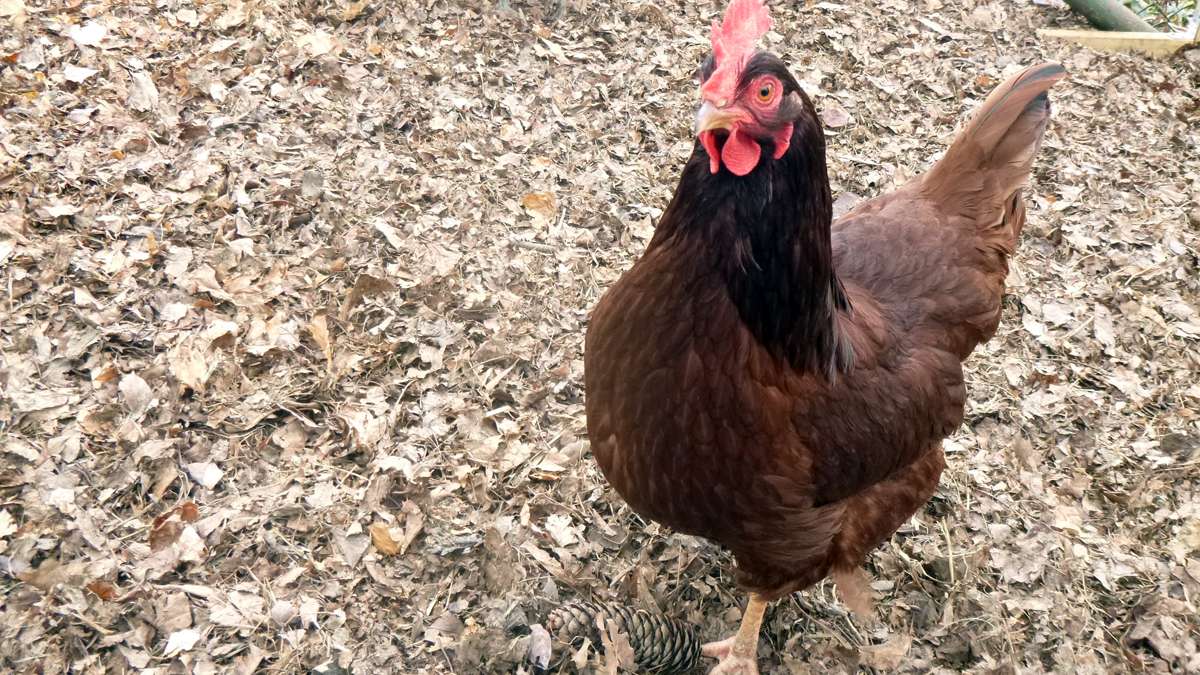
A lone hen wanders the grounds of the Marg-Bracken flock in Bala Cynwyd, Pa.(Jennifer Lynnn/WHYY)
-
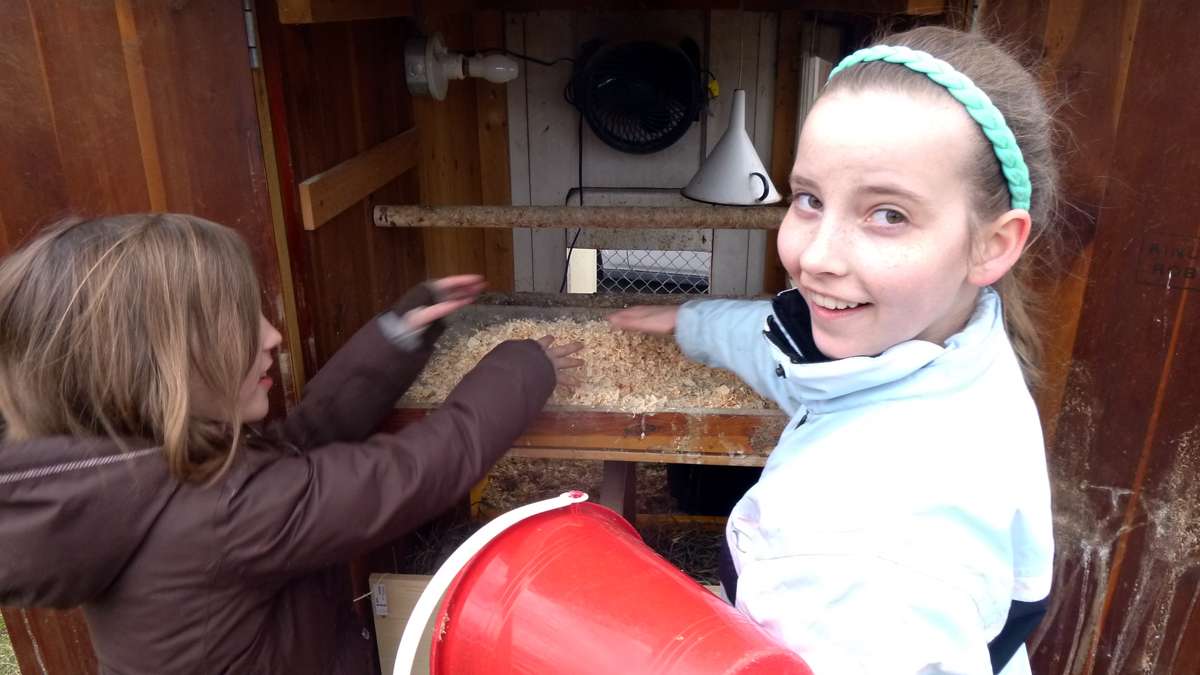
Marlena Marg-Bracken, 9, (left) and her sister Ariadne, 13, freshen up the hens' bedding in the coop. (Jennifer Lynnn/WHYY)
-
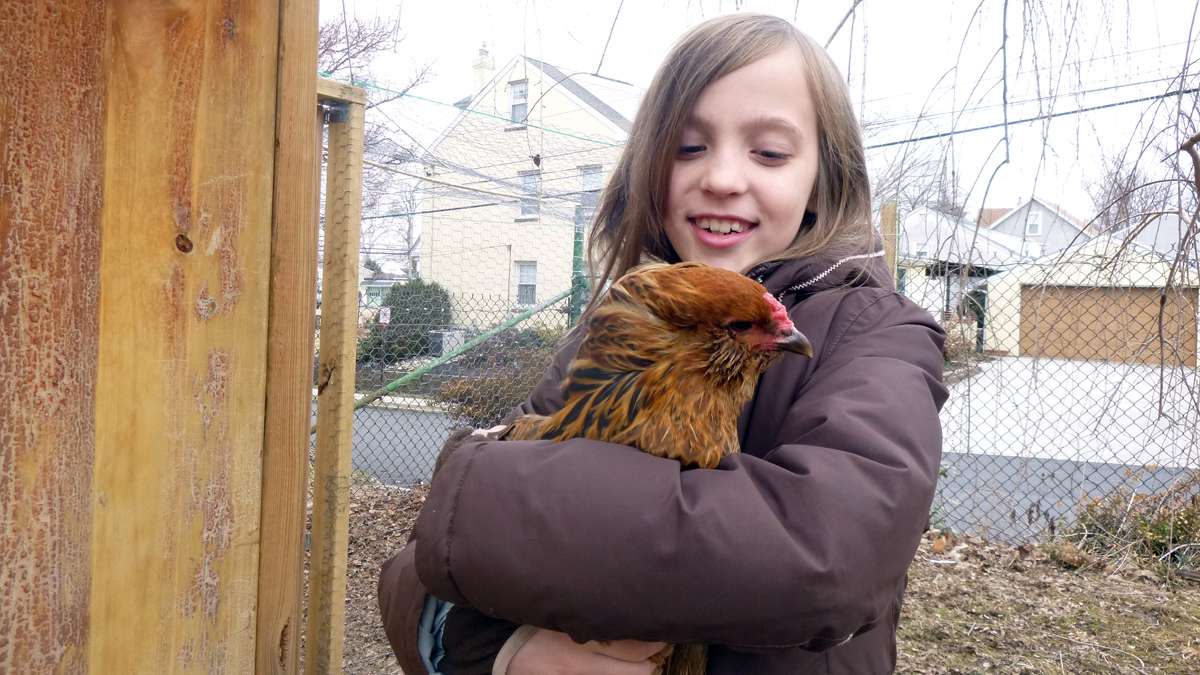
Marlena Marg-Bracken, 9, with Snuggles the chicken, who is blind in one eye and who lays beautiful bluish-green eggs. (Jennifer Lynn/WHYY)
-
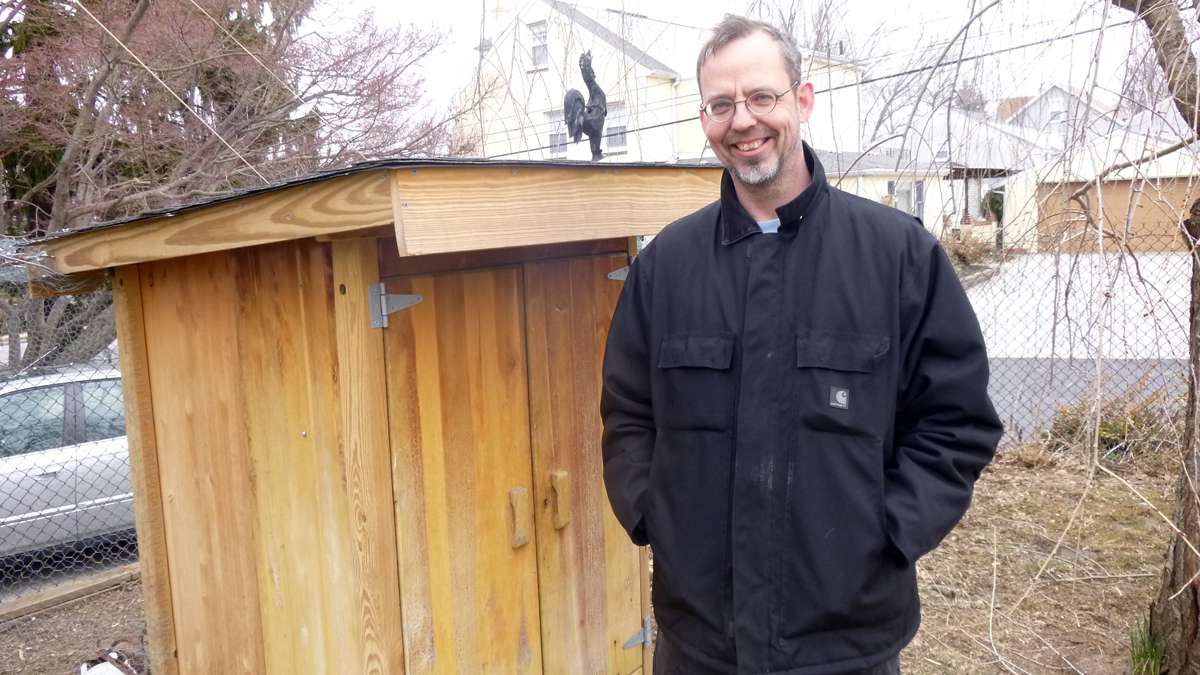
Thilo Marg-Bracken, father, and builder of the coop, made of an old dresser and recycled hardware. (Jennifer Lynn/WHYY)
-
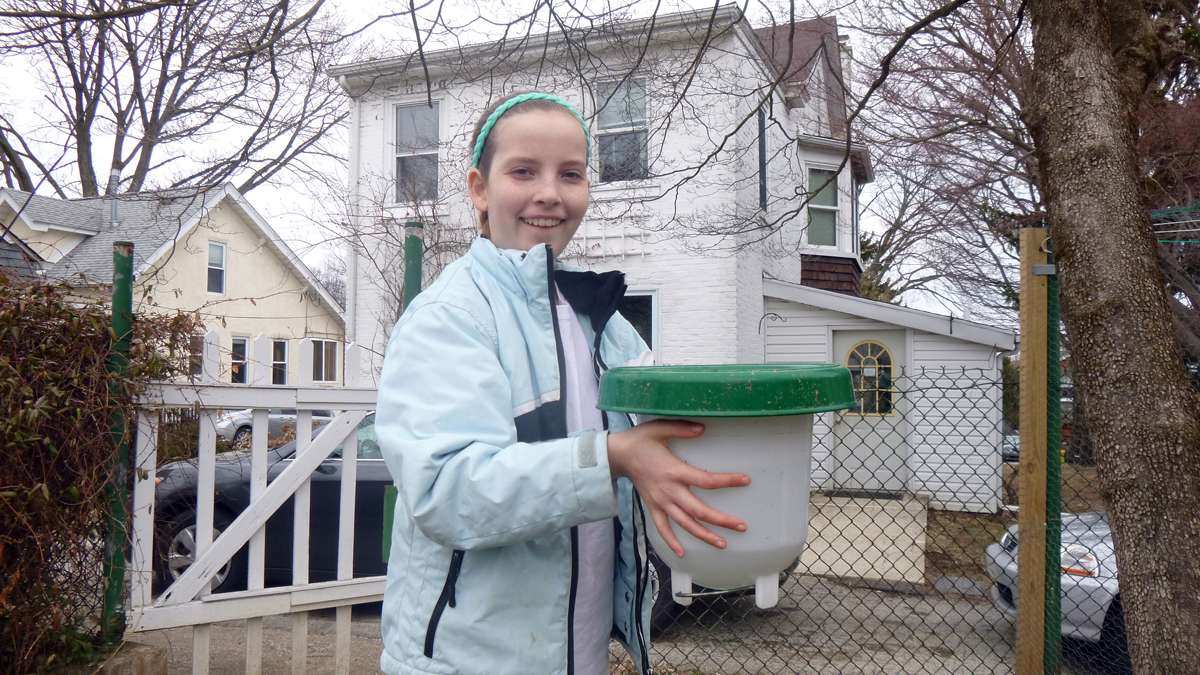
Ariadne Marg-Bracken, 13, with the chicken coop's watering trough. (Jennifer Lynn/WHYY)
-
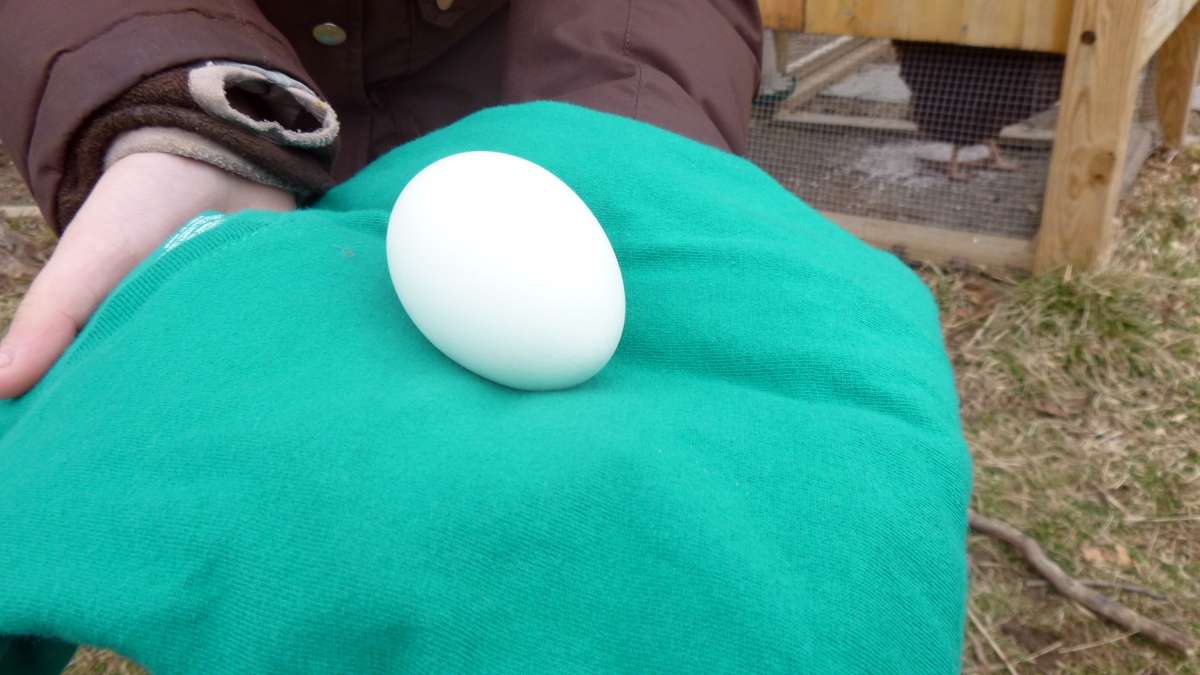
It can be difficult to see in contrast to the sweater it is resting on, but Snuggles' egg is a delicate shade of blue-green, characteristic of the Ameraucana breed. (Jennifer Lynn/WHYY)
Raising chickens in suburban Philadelphia is not something state agriculture officials track, but they suspect interest in so-called “hobby flocks” is on the rise. WHYY’s Jennifer Lynn visited a flock that’s become quite dear to a family because one of the birds does things differently.
Raising chickens for their eggs and as pets in suburban Philadelphia is not something state agriculture officials keep track of, but they suspect interest in so-called “hobby flocks” is on the rise.
The Marg-Bracken family lives in Bala Cynwyd. For about a year now, their routine has involved the daily care of three chickens, housed prominently in a corner of their backyard. The flock has become quite dear them because one of the birds does things differently.
Marlena, 9, handles the morning ritual: releasing the feisty birds from their coop, an old hollowed out dresser with chicken wire and hardware from past projects.
She approaches the coop and says “Hello, good morning!” to the birds: Snuggles, Peanut, and Indi. “They’re having a nervous breakdown,” Marlena says. “They bock a lot because they just want to come out.”
No roosters allowed
The family bought the chickens just before Easter last year. Big-sister Ariadne begged her parents to get them.
“Well, my friend had chickens, and I really liked going to her farm and stuff,” Ariadne says. “Like, the other alternative would have been cows. But they are very big.”
The girls’ parents, Heather and Thilo, took a while to warm up to the idea of raising chickens — never mind cows — purchased as chicks from an area farm. Many months into the process, things have gone pretty well.
“They are really low maintenance,” Heather says. “The main thing is getting a shelter that’s protective for them, and then they are easy to care for.”
“Once you have a fluffy little thing in your hand, you are hooked,” Thilo says.
So are the neighbors, he says. Locals frequently pause in their driveway, amused by the flock. He says his township has fairly reasonable guidelines about housing the birds. Mostly, keep them away from other houses. And no roosters.
On this morning, there are eggs.
“We got an egg!” Marlena says.
“The brown ones that are spotted are usually from Indi,” Ariadne adds. “The bluish-green ones are from Snuggles.”
A (feathered) friend in need
The flock has become quite dear to the family because Snuggles does things a little bit differently. Snuggles is special.
“See this eye right here?” says Marlena “She can’t see through it.”
Heather explains: “Yeah, she had an eye that wasn’t opening right and looked infected when we got her. We didn’t want to take her back, so we found some drops at the pet store, gave her those, and I would spend a couple times a day holding her and massaging below her eye just to help it drain.”
The family nursed Snuggles back to health, but damage to the eye made it difficult for the bird to move around the coop, to roost and to eat.
“When we figured out that Snuggles was just sitting down in the tray, then we passed the ‘Chicken Disabilities Act’ and had to make reasonable accommodations to get the chicken where it needed to be,” Thilo says.
This included building steps and a ramp for Snuggles, who does just fine now and has become the pride of the flock because she lays those exquisite blue-green eggs, a telltale sign of the Ameraucana breed.
“They’re called Easter Eggers, also,” says Ariadne. “Their eggs are different colors, like Easter egg color, but you don’t have to dye them or anything like that.”
Heather and Thilo say having the chickens helps the girls learn that living things need more than food and water for survival.
Asked if her heart grows a little bit when she cares for a little chicken that needed some help, Ariadne says “I think it was good she got a good home and was able to survive and stuff. We probably saved a chicken’s life. Even though — guess what — there are more chickens than humans in the world.”
So be nice to chickens. They could rule the world one day.
“Chicken apocalypse,” jokes Ariadne.
More like “a-bock-a-lypse.”
WHYY is your source for fact-based, in-depth journalism and information. As a nonprofit organization, we rely on financial support from readers like you. Please give today.


